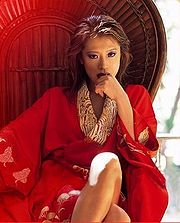You can now "Thank" others for their contributions, set up email and two-factor authentication, and more!
Nakamori Akina

Nakamori Akina (中森明菜) is an award-winning Japanese pop singer and actress who debuted in 1982. She is a face of the idol era of the 80s alongside Matsuda Seiko with such classic hits such as "Second Love", "Kazari Janai no yo Namida wa" and "Desire -Jounetsu-." As a singer, Nakamori came to be known for her mature yet rebellious style and powerhouse vocals, but also for her ever-changing image both visually and musically as opposed to the conservative J-Pop scene. Nakamori is also known as "the queen of tragedy" because most of her songs have a serious or sad tone unlike the normal happy and carefree sound heard in pop music. She was highly successful from her debut to 1989, when she attempted suicide after a failed romance with Kondo Masahiko and due to stress induced by the invasive tabloid media. Even though she has never regained the same success, she has still managed to carry on a steady career.
Today, Nakamori has built her image as a cover artist with her Utahime cover albums and also more recently with the award winning Enka. As of 2013, she is the 20th best selling artist in Japan with over 25.37 million records sold. With a career of 30 years, she has explored many different music genres including pop, rock, R&B, jazz, folk, blues, enka, and Latin music.
Profile
- Name:: Nakamori Akina (中森明菜)
- Birthdate: July 13, 1965
- Birth Place: Kiyose, Tokyo, Japan
- Blood Type: A
- Height: 160cm (5'2 ¾" ft.)
- Weight: 43kg (94.8 lbs.)
- Shoe Size: 23.5cm (8)
- Measurements: 80/52/85cm (31/20/33 in.)
- Siblings: 2 elder sisters (Akie, Akiko), 2 elder brothers (Akihiro, Akinori), and 1 younger sister (Akiho)
- Hobbies: Reading, cooking, photography, pottery, sketching, and traveling
- Favorites: Shopping, pasta, chicken, shrimp, melon, ice cream, Audrey Hepburn, Tom Cruise, Ken Takakura, New York, and Elle magazine
- Idol: Yamaguchi Momoe
Biography
Beginnings
Nakamori Akina entered the music industry through a singing talent contest "Star Tanjo". She first appeared on the contest in 1979 at the age of 13 singing Iwasaki Hiromi's "Natsu ni Dakarete", but she failed to impress the judges because the song was supposedly too mature for a girl of her age. She tried again in 1980 by singing Matsuda Seiko's "Hadashi no Kisetsu", but she still didn't impress the judges. It wasn't until her third try with the contest in 1981 that she finally won by singing Yamaguchi Momoe's "Yumesaki Annainin" with a record score of 392 points, beating her opponents easily.
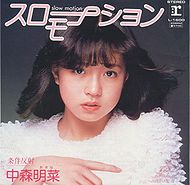
Signed to Warner-Pioneer Nakamori debuted with the ballad single "Slow Motion" on May 1 of 1982 which originally struggled to make its way to the Oricon charts. Her second single "Shoujo A" was almost banned because of the lyrics describing a bad flirting girl motorcyclist (something that might have been inspired by Yamaguchi Momoe's early suggestive songs such as "Aoi Kajitsu"), but it showed better success than her debut single by reaching #5 and selling over 396,000 copies. "Shojo A" was originally planned to be Nakamori's debuting single but due to its rebellious nature "Slow Motion" was chosen instead for a softer impression of Nakamori. "Shojo A"'s popularity actually caused her debut single to return to the charts making it reach all the way to #30. In total "Slow Motion" stayed on the charts for 39 weeks and sold over 420,000 copies. Thanks to the success of "Shojo A" she also made her first appearance on the popular TV show at the time, THE BEST 10, which gave her even more exposure. It wasn't until her 3rd single "Second Love" (which is also her highest selling single ever with over 990,000 copies sold) that she began dominating the #1 spot in the single rankings. Both "Slow Motion" and "Second Love" were composed by Kisugi Takao and still to this date, they're one of Nakamori's most requested songs.
Rise to Success
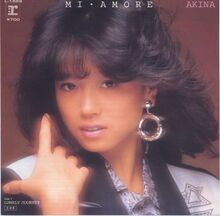
In 1985, Nakamori made her acting debut in the movie Ai Tabidachi playing a woman dying from heart ailment. The movie co-starred the idol Kondo Masahiko, and a romance developed between Nakamori and him. The movie also did well at the box office and was the 8th most popular movie of 1985 in Japan. Another success that year came with the single "Meu Amor e" winning Nakamori the Record Taisho Grand Prize. It was considered that she might be too young to win such a prize, though. "Meu Amor e" sold over 631,000 copies and reached the #1 spot. The single was re-released as "Akai Tori Nigeta" which featured different lyrics, which were actually the original ones but due to composer Matsuoka Naoya's discontent with them not embracing the Latino sound new lyrics were written thus creating "Meu Amor e". Even as a re-release, the single still reached #1 and sold over 354,000 copies.
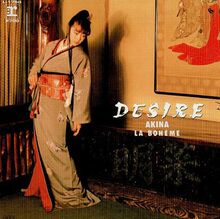
At the beginning of 1986, the single what would later probably be called Nakamori's signature song, "Desire -Jounetsu-", was released. Much of the public attention came from Nakamori's visual presentation of the song. Wearing a bob wig, a customized kimono outfit, and performing a subtle yet effective dance choreography, Nakamori made a strong impact through which she is still easily recognized. The single earned her her second Record Taisho Grand Prize.
In 1986, Nakamori released her first self-produced and most experimental album Fushigi, which is considered to be one of her most artistic works ever. Inspired by the movie The Exorcist, this conceptual album differed from her previous works with a more mysterious and eerie sound both musically and vocally. On the album, Nakamori sang in a more dramatic manner, and her vocals were also mixed into the background. The unusual vocal mixing caused some confusion among consumers and some actually contacted the retailers thinking the record was defective (some of the songs were later revisited in a more traditionally "clean" manner on the mini-album Wonder). Despite the riskiness of trying something avant-garde, the album still reached #1 and sold over 464,000 copies.
The same year saw Nakamori pursuing a more mature and womanly image as opposed to the typical cute and carefree Japanese idol image. That summer a ruby ring appeared on Nakamori's finger, given by Kondo Masahiko, which stirred rumors of a possibly soon-to-be marriage. Late in December, a widely acclaimed album Crimson was released which contained songs composed only by women. In addition to being a commercial success and widely appreciated by fans, in late 1987 the album also won The 29th Nihon Record Taisho's Best Album award. In 1987, she tried her luck with the American music industry by releasing her first and only English release Cross My Palm. For the album, Nakamori collaborated with western composers and arrangers, and it was her first release to make use of music videos as promotion. The melody of her latest single at the time, "Blonde," was also used on the album with English lyrics as was a new arrangement titled "The Look That Kills". Unfortunately, the album did poorly in America due to poor promotion and Nakamori's lacking pronunciation making it a mild success only in Japan with sales over 343,000 copies. Her 1988 album Femme Fatale also featured collaborations with western artists, but the album was mostly in Japanese and released only in Japan.

The relationship between Nakamori Akina and Kondo Masahiko had become strained by 1987, which could be heard on the heartbroken single "Nanpasen", released the same year. The song was offered by the famous folk singer Kato Tokiko who seldom offered her songs to idols. Nakamori, however, showed enough artistic talent to perform the song and thus proved to the public that she was more than a typical pop idol. The single sold over 431,000 copies and reached #1 on the charts. 1988 saw Nakamori's music turn more and more towards a more brooding nature, and her diminishing weight became a topic in the media. By the early 1989, Nakamori had finally removed the ring that Kondo Masahiko had given her in 1986 and another ballad involving heartbreak was released called "LIAR" which sold over 275,000 copies and placed at #1. The single was also included on her next original album CRUISE which was a ballad album. The same year, rumors about Kondo Masahiko and the famous Japanese idol Matsuda Seiko having an affair started to circulate. Because of the failed relationship and stress due to invasive tabloid media/ Nakamori finally attempted suicide on July 11, 1989 at Kondo's apartment. She was hospitalized and recovered, but the attempt did have a negative impact on her public image. That December, a press conference was held where Nakamori publicly apologized for her selfish act and announced she would continue her career the following year.
After the incident, Nakamori took a break in Hawaii, but made a comeback in 1990 with the optimistic single "Dear Friend" which did well with over 548,000 copies sold. However, her contract with Warner-Pioneer was coming to an end. After "Dear Friend", she released only two new singles until 1991, which followed her previously wistful style rather than the cheerful image portrayed with "Dear Friend". Warner-Pioneer was eager to continue the contract but Nakamori refused seeking better control over her career. Due to copyright problems, she would take another break until her next new release with a new label, MCA Victor Japan. From April 1992 to December 1993, she had her own radio show "Fifty Off" on Tokyo FM.
The Return of the Utahime
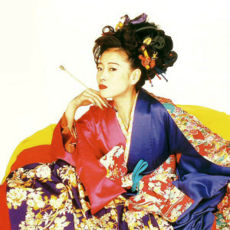
Nakamori's first release with MCA Victor Japan came in 1993 with the ballad single "Everlasting Love." The single showed a drastic decline in her sales with only 129,000 copies sold and it charted only at the #10 spot. Although written by the internationally acclaimed composer Sakamoto Ryuichi, Nakamori wasn't quite pleased with the song, hoping for something more upbeat, and as a result never performed it (nor the second A-side "NOT CRAZY TO ME") after the few promotional TV performances. Later that year, she finally released a new original album titled UNBALANCE+BALANCE which introduced her new hit song "Aibu", provided by the new rising songwriter Komuro Tetsuya. The album sold over 186,000 copies and reached #4, but it still didn't do as well as her Warner-era releases. The next year she released her first cover album Utahime, which focused on songs from the 70's chosen by her. One of the songs, "Aizen Bashi," was originally performed by her idol Yamaguchi Momoe in 1979. All the tracks featured string arrangements by the famous composer and arranger Senju Akira (who would also be in charge of the later Utahime releases).
In 1995, Nakamori's mother died at the age of 58. Nakamori later revealed that her becoming a singer was originally her mother's dream and not hers. The same year, she released her next original album, La Alteracion, which sold moderately well with over 149,000 copies sold and peaked at #7. At the end of the year, she released her first self-cover album, true album ~akina 95 best~, which also included her latest singles with MCA Victor. The three-disc collection was divided into three themes: wild, world music, and whispered ballads. The collection peaked at #16 and sold over 86,000 copies.
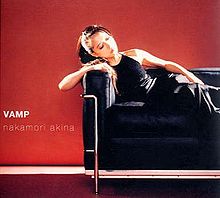
In 1996, Nakamori returned to a more mysterious yet dance-driven sound with the single "MOONLIGHT SHADOW ~Tsuki ni Hoero~," which peaked at #14 and sold 112,000 copies. Before the end of the year, she released the experimental mini-album VAMP. It followed a theme of a sensual "femme fatale"-type seductress image common for Nakamori. The release, however, showed little success by reaching only #30 and selling over 32,000 copies. The urban soundscape continued on her next original album SHAKER, but as according to the title, it was also a mix of different of styles such as techno and folk-like songs. The album peaked at #14 and sold over 44,000 copies. After the album release, Nakamori did her first national tour in nine years and a live video "Felicidad" was released.
The year 1997 marked the end of her contract with MCA Victor Japan and in 1998 she released the single "Kisei ~Never Forget~" under a new label, GAUSS Entertainment. The single peaked at #19 and sold over 95,000 copies. Unfortunately, her later releases had little success until ZERO album - Utahime 2. Her next album, SPOON, featured songs composed by ORIGA among others giving the album an ethereal feel to it, but the album showed even more declining sales with only over 23,000 copies sold.
In 1999, Nakamori starred the drama series Border as a detective, but the series had to be stopped after Nakamori fell and suffered fractured ribs which later also got infected leading her to be hospitalized. Rumors speculated this to be only a publicity gimmick as Nakamori had supposedly lost motivation to work with the series and her record company had become displeased with it. Things also didn't fare so well with her next album Will, released the same year, which is marked as her weakest selling original album ever with only over 5,000 copies sold. Later that year, she performed her first ever soundtrack theme song "Tsuki no Hohoemi" for the PlayStation game Wizardry ~DIMGUIL~ which was also included on the Will album as an acoustic version. Soon after Will, her contract with GAUSS Entertainment was terminated by the label.
Journey to the 21st century
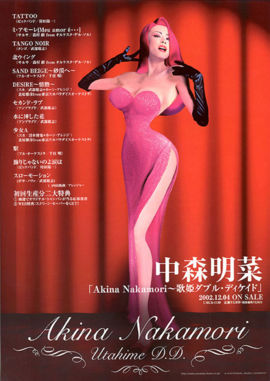
In 2002, Nakamori signed to Universal Music Japan and a comeback album ZERO album - Utahime 2 was released, selling over 229,000 copies. She once again covered a song by her idol Yamaguchi Momoe called "Cosmos". The comeback didn't endure for long, as she quickly released her next original album Resonancia. With this album, she returned to rather small sales with only over 30,000 copies sold. With Resonancia, she explored a new style both musically and vocally. The album was a mix of R&B and Latino music, and it featured Nakamori singing in a softer manner as opposed to the more powerful and deeper style that she is known for. Her record label described the album as re-branding Nakamori as the Japanese Jennifer Lopez. The same year, her albums with MCA Victor Japan were re-released with singles and their b-sides added to them. At the end of the year, she also released another album, Utahime Double Decade. Although the album bears the title "Utahime", it wasn't actually part of the "Utahime" series as it was a self-cover album. The album showcased Nakamori covering her Warner-era hits in big band, bossa nova, salsa, ska, and tango styles with the songs also being fully orchestrated. It sold over 83,046 copies and peaked at #8. A mild threat was made by Nakamori that if the album would not succeed she would call it quits for her career. She ended the year by making a long-awaited return to the new year's eve singing competition Kouhaku Utakassen singing her newly arranged hit song "Kazari Janai no yo Namida wa", which gained her the fourth highest viewer ratings of the show.
The following year, Nakamori released the ballad single "Days" whose lyrics she herself wrote. The single's name foretold the theme of her next album I Hope So, which was "time". This was her second ballad album since CRUISE and it peaked at #15 selling over 18,000 copies. The title song was Nakamori's first commercial song whose lyrics she composed. The song was featured in Japan Railways' commercial. Later that year, the third and final album to the "Utahime" series, Utahime 3 ~Shuumaku, was released. The theme of the final cover album was "dandyism" which showcases the fact that all the songs were originally performed by men.
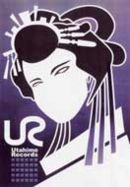
In 2004 Nakamori released "Akai Hana", her first ever single under her very own Utahime Records label distributed by Universal Music. The song was a cover of the South Korean drama All In's theme song "WHO", but it featured new lyrics. Her next single, "Hajimete Deatta Hi no You ni," was a variation of the same song with, yet again, different lyrics and a slightly altered arrangement. "Akai Hana" featured lyrics involving heartbreak while "Hajimete Deatta Hi no You ni" was a more optimistic version. The Utahime Records label had given Nakamori the chance to plan her own selection of songs, advertisement, production and also to find and produce new talents. According to Nakamori, she had been planning on starting her own label for five years prior. In 2006, she finally released her first original album under her private label, called DESTINATION, which featured dance-influenced R&B-like songs. Although it sold only over 10,000 copies, MUSIC MAGAZINE gave it 9 out of 10 points making it even more evident that Nakamori's declining sales might be more due to the lack of promotion than due to the possibility that her releases might be getting "worse".
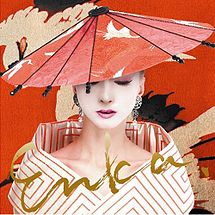
In 2007, Nakamori returned to the "Utahime" series by releasing Utahime Best - 25th Anniversary Selection, which included three new cover songs , one of which was a live performance and one song once again originally by Yamaguchi Momoe, a theme song used for the movie Tabi no Okurimono 0:00 Hatsu. The album turned out to be a mild success for her with over 43,500 copies sold. Later that year, it was announced that Ballade Best would feature one new song, "Ano Natsu no Hi," and three re-recorded tracks. The limited edition came with a DVD which contains footage of her first ever live concert in 1983, which had never been released before.
In April, a new album Enka was announced to be released on the 20th of June. Nakamori now continued to cover classic enka songs with an orchestra, once again arranged by Senju Akira. This was also the first time that fans had the chance to interact with Nakamori by voting for their favorite songs at her official website. Later in May, it was also announced that the release date had been pushed back to June 27th. On June 7th, the tracklist was finally announced revealing that only three of the songs were chosen independently by Nakamori, and the rest were chosen from the poll. The album was released in four editions, with the limited DVD included recording material, promotional video material, and interviews. The limited 2CD edition featured instrumental tracks and also a bonus track. The cassette tape edition was introduced as a nostalgia item related to the genre's reputation as music of the older generations.
On June 26th, Nakamori paid a visit to the Toyokawa Inari Shrine where she prayed for her coming album to be a success. That same day she did a Yahoo! Live Talk-interview in which she revealed that the idea for doing an enka cover album wasn't hers since she wasn't comfortable with the singing style, which she viewed as a too big of a challenge, but her staff finally convinced her otherwise. Even with limited promotion, Enka still turned out to be a mildly successful release for Nakamori as it reached #10 and charted for 12 weeks selling over 61,412 copies. It was later awarded at the 22nd Japan Gold Disc Award's Best Enka Artist category alongside Hikawa Kiyoshi for introducing enka in favorable new light.
On August 30, 2022, she opened a Twitter Account that gained over 200,000 followers within just hours.
Trivia
- Nakamori was to originally debut by the stage name Nakamori Asuna but she refused the idea in the end.
- Nakamori took ballet lessons from the age of 4 through 13. The influence can still be seen in some of her choreographies that she performs live. Her single Hana yo Odore makes use of a photo of her in those days on the cover.
- Not only was Nakamori the youngest ever (20-years old) at the time to win the Record Taisho Grand Prize, but she was also the second to win it twice and the first to win it in consecutive years.
- Although most of Nakamori's song lyrics are written by others for her, she has written some herself. Some of them are under the pen name Miran:Miran.
- She doesn't like using mobile telephones and thus doesn't own one.
- Casablanca is her favorite flower
- Madoka, a character from the popular manga and anime Kimagure Orange Road, is a character that Matsumoto Izumi created while inspired by Nakamori's Shojo A.
- Nakamori is well traveled, having been to many places across the globe including Hawaii, France, Los Angeles, Switzerland, Italy, China, Spain, England, Greece, Thailand, New York, Taiwan, the Bahamas, and the Philippines.
Discography
Albums
- [1982.07.01] Prologue (Jomaku) (序幕 (プロローグ))
- [1982.10.27] Variation (Hensoukyoku) (変奏曲 (バリエーション))
- [1983.03.23] Fantasy (Gensoukyoku) (幻想曲(ファンタジー))
- [1983.08.10] NEW AKINA Etranger (NEW AKINA エトランゼ)
- [1984.05.01] ANNIVERSARY
- [1984.10.10] POSSIBILITY
- [1985.04.03] BITTER AND SWEET
- [1985.08.10] D404ME
- [1986.08.11] Fushigi (不思議; Mystery)
- [1986.12.24] CRIMSON
- [1987.08.25] Cross My Palm
- [1988.03.03] Stock
- [1988.08.03] Femme Fatale
- [1989.07.25] CRUISE
- [1993.09.22] UNBALANCE+BALANCE
- [1995.07.21] la alteración
- [1997.03.21] SHAKER
- [1998.06.17] SPOON
- [1999.12.01] will
- [2002.05.22] Resonancia
- [2003.05.14] I hope so
- [2006.06.21] DESTINATION
- [2009.08.26] DIVA
- [2015.12.30] FIXER
- [2017.11.08] Akina
Mini-Albums
- [1982.12.24] Seventeen
- [1984.12.21] SILENT LOVE
- [1985.12.21] MY BEST THANKS
- [1987.05.01] CD'87
- [1988.06.01] Wonder
- [1996.12.18] VAMP
Compilation Albums
- [1983.12.21] BEST AKINA Memoires (BEST AKINA メモワール)
- [1986.04.01] BEST
- [1988.12.24] BEST II
- [1992.11.10] BEST III
- [1993.12.10] Mou Hitori no Akina (もう一人の明菜) (B-side Compilation)
- [1995.12.06] true album akina 95 best
- [2002.12.04] Akina Nakamori ~Utahime Double Decade (Akina Nakamori〜歌姫ダブル・ディケイド)
- [2006.01.11] BEST FINGER 25th anniversary selection
- [2007.01.17] Utahime Best ~25th Anniversary Selection~ (歌姫ベスト ~25th Anniversary Selection~)
- [2007.03.28] Ballad Best 25th Anniversary Selection(バラード・ベスト 25th Anniversary Selection)
- [2008.02.27] Diva legend ~ '90s BEST (歌姫伝説~’90s BEST)
- [2012.07.11] Best Collection ~Love Songs & Pop Songs~ (ベスト・コレクション~ラブ・ソングス&ポップ・ソングス~ )
- [2014.08.06] ALL TIME BEST -Original- (オールタイム・ベスト -オリジナル-)
- [2014.08.06] ALL TIME BEST -Utahime (Cover)- (オールタイム・ベスト -歌姫(カヴァー)-)
- [2021.06.09] Anniversary complete analog single collection 1982-1991
Live Albums
- [1989.11.17] AKINA EAST LIVE INDEX-XXIII
- [1991.11.28] Listen to Me
Cover Albums
- [1994.03.24] Utahime (歌姫; Song Princess)
- [2002.03.20] -ZEROalbum- Utahime 2 (-ZEROalbum- 歌姫2; Song Princess)
- [2002.12.04] Utahime Special Edition (歌姫; Song Princess)
- [2003.12.03] Utahime 3 ~Shuumaku (歌姫3 〜終幕; Song Princess ~End)
- [2007.06.27] Enka (艶華)
- [2008.12.24] Folk Song ~Utahime Jojouka (フォーク・ソング~歌姫抒情歌; Song Princess' Expression of Feelings)
- [2009.06.24] Mood Kayou ~Utahime Showa Meikyoku Shuu~ (ムード歌謡 ~歌姫昭和名曲集~; Mood Songs ~Collection of Famous Pieces of Music from the Showa Era~)
- [2009.07.29] Folk Song 2 ~Utahime Aishouka (フォーク・ソング2 ~歌姫哀翔歌)
- [2015.01.28] Utahime 4 -My Eggs Benedict- (歌姫4 -My Eggs Benedict-)
- [2016.11.30] Belie
- [2017.11.08] Cage
Others Albums
- [2002.12.04] UNBALANCE+BALANCE+6 (Reissue)
- [2002.12.04] la alteración+4 (Reissue)
- [2002.12.04] SHAKER+3 (Reissue)
Box Sets
- [2004.12.01] Utahime Complete Box Empress Akina Nakamori 1994 ~ 2004
- [2006.06.21] Akina Box
Singles
- [1982.05.01] Slow Motion (スローモーション)
- [1982.07.28] Shoujo A (少女A; Girl A)
- [1982.11.10] Second Love (セカンド・ラブ)
- [1983.02.23] 1/2 no Shinwa (1⁄2の神話; 1/2 Myth)
- [1983.06.01] Twilight -Yuugure Tayori- (トワイライト -夕暮れ便り-)
- [1983.09.07] Kinku (禁区; Prohibition District)
- [1984.01.01] Kita Wing (北ウイング; The North Wing)
- [1984.04.11] Southern Wind (サザン・ウインド)
- [1984.07.25] Jukkai (1984) (十戒; Ten Commandments)
- [1984.11.14] Kazari Janai no yo Namida wa (飾りじゃないのよ涙は; Tears Are No Decoration)
- [1985.03.08] Meu Amor é (ミ・アモーレ)
- [1985.05.01] Akai Tori Nigeta (赤い鳥逃げた; A Red Bird Ran Away)
- [1985.06.19] SAND BEIGE -Sabaku e- (砂漠へ; To the Desert)
- [1985.10.09] SOLITUDE
- [1986.02.03] DESIRE -Jounetsu- (情熱; Passion)
- [1986.05.26] Gypsy Queen (ジプシー・クイーン)
- [1986.09.25] Fin
- [1987.02.03] TANGO NOIR (Black Tango)
- [1987.06.03] BLONDE
- [1987.09.30] Nanpasen (難破船; Wrecked Ship)
- [1988.01.27] AL-MAUJ (アルマージ)
- [1988.05.18] TATTOO
- [1988.11.01] I MISSED "THE SHOCK"
- [1989.04.25] LIAR
- [1990.07.17] Dear Friend
- [1990.11.16] Mizu ni Sashita Hana (水に挿した花; The Flower That Goes to Water)
- [1991.03.25] Futari Shizuka "Tenkawa Densetsu Satsujin Jiken Yori" (二人静 -「天河伝説殺人事件」より; From Two People "Heaven's River Legend Murder Quietness-")
- [1993.05.21] Everlasting Love
- [1994.03.24] Kataomoi (片想い; Unrequited Love)
- [1994.09.02] Yoru no Dokoka de ~night shift~ (夜のどこかで; Somewhere in the Night)
- [1994.10.05] Gekka (月華; Monthly Flowers)
- [1995.06.21] Genshi, Onna wa Taiyou Datta (原始、女は太陽だった; Genesis, Woman was the Sun)
- [1995.11.01] Tokyo Rose
- [1996.08.07] MOONLIGHT SHADOW ~Tsuki ni Hoero~ (月に吠えろ; Bark at the Moon)
- [1997.02.21] APPETITE
- [1998.02.11] Kisei ~Never Forget~ (帰省; Homecoming)
- [1998.05.21] Kon'ya, Nagareboshi (今夜、流れ星; Tonight, A Shooting Star)
- [1998.09.23] Tomadoi (とまどい)
- [1999.01.21] Ophelia (オフェリア)
- [1999.12.01] Trust Me
- [2001.06.06] It's brand new day
- [2002.05.02] The Heat ~musica fiesta~
- [2003.04.30] Days
- [2004.05.12] Akai Hana (赤い花; Red Flower)
- [2004.07.07] Hajimete Deatta Hi no You ni (初めて出逢った日のように)
- [2005.12.07] Rakka Ryusui (落花流水; Fallen Blossoms Stream)
- [2006.05.17] Hana yo Odore (花よ踊れ; Dancing flower)
- [2009.09.23] DIVA
- [2015.01.21] ROJO -TIERRA- (ロホ ティエラ; Red Earth)
- [2015.09.30] unfixable
Concerts
- [1985.12.10] BITTER & SWEET 1985 SUMMER TOUR (VHS)
- [1989.11.28] AKINA EAST LIVE INDEX-XXIII (VHS)
- [1992.07.25] Dream '91 Akina Nakamori Special Live (VHS)
- [1993.08.25] Live in '87 A HUNDRED days (VHS)
- [1993.08.25] Live in '88 Femme Fatale (VHS)
- [1995.03.24] Utahime AKINA NAKAMORI PARCO THEATER LIVE (VHS)
- [1997.09.22] felicidad AKINA NAKAMORI LIVE '97 (VHS)
- [2000.06.16] Utahime AKINA NAKAMORI PARCO THEATER LIVE (DVD)
- [2000.06.16] felicidad AKINA NAKAMORI LIVE '97 (DVD)
- [2006.06.21] BITTER & SWEET 1985 SUMMER TOUR (5.1 channel surround DVD version)
- [2006.06.21] AKINA EAST LIVE INDEX-XXIII (5.1 channel surround DVD version)
- [2006.06.21] Dream '91 Akina Nakamori Special Live (5.1 channel surround DVD version)
- [2006.06.21] Live in '87 A HUNDRED days (5.1 channel surround DVD version)
- [2006.06.21] Live in '88 Femme Fatale (5.1 channel surround DVD version)
- [2001.09.27] Akina Nakamori 2001 - 20th Anniversary Live ~It's brand new day~
- [2002.12.03] AKINA NAKAMORI MUSICA FIESTA TOUR 2002
- [2003.12.17] Live tour 2003 ~I hope so~
- [2006.01.11] Akina Nakamori Special Live 2005 Empress at CLUB eX
- [2007.01.17] LIVE TOUR 2006 The Last Destination
Filmography
Movies
- [1985.01.26] Ai Tabidachi
- [1992.07.25] Hashire Melos! (anime)
TV Dramas
- [1991.01.03] Sayonara 6nen 2gumi
- [1992.04.13 - 1992.06.29] Sugao no Mama de
- [1993.04.14 - 1993.06.30] Chansu!
- [1998.01.12 - 1998.03.16] Tsumetai Tsuki
- [1999.01.11 - 1999.03.08] Border ~Hanzai Shinri Sousatsu File
- [2006.04.12 - 2006.06.21] Primadam
External Links
| |||||||||||||||||||||||||||||||||||||||
